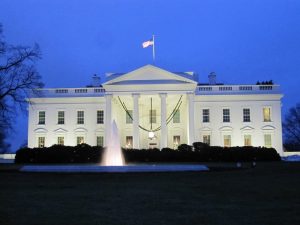 The Music Modernization Act has been signed into law in a high-profile event at the White House. H.R. 1551, known formally as the “Orrin G. Hatch-Bob Goodlatte Music Modernization Act”, was written to update music copyright law for the digital era. The legislation was unanimously passed by both the House and the Senate.
The Music Modernization Act has been signed into law in a high-profile event at the White House. H.R. 1551, known formally as the “Orrin G. Hatch-Bob Goodlatte Music Modernization Act”, was written to update music copyright law for the digital era. The legislation was unanimously passed by both the House and the Senate.
During the signing ceremony, President Trump said that the MMA was a milestone that would “close loopholes” in copyright law and help music creators get paid. Several notable figures from the music industry were at the White House for the signing, including country singer John Rich, Jeff “Skunk” Baxter of the Doobie Brothers’, and Kid Rock.
The new legislation targets several areas of interest to the music industry. One area of the legislation, called the Classics Act, ensures that songwriters and artists receive royalties on songs recorded before 1972. The law establishes a new, independent entity to pay rights-holders in a more streamlined fashion. It also creates a publicly accessible database to make it easier to discern who should be paid for a particular song.
Music business leaders reacted positively to the signing. Representatives from the Association of Independent Music Publishers said, “This marks the first significant federal legislation since 1998’s Digital Millennium Copyright Act (DMCA) to address the needs of rights-holders in today’s online age.”
Neil Portnow, president and CEO of the Recording Academy, released a statement saying: “With the president’s signature today, the Music Modernization Act is officially the law of the land. As we celebrate the harmony and unity that got us here, we applaud the efforts of the thousands of performers, songwriters, and studio professionals who rallied for historic change to ensure all music creators are compensated fairly when their work is used by digital and satellite music services. We thank the members of Congress who championed this issue throughout the past several years to bring music law into the 21st century.”
